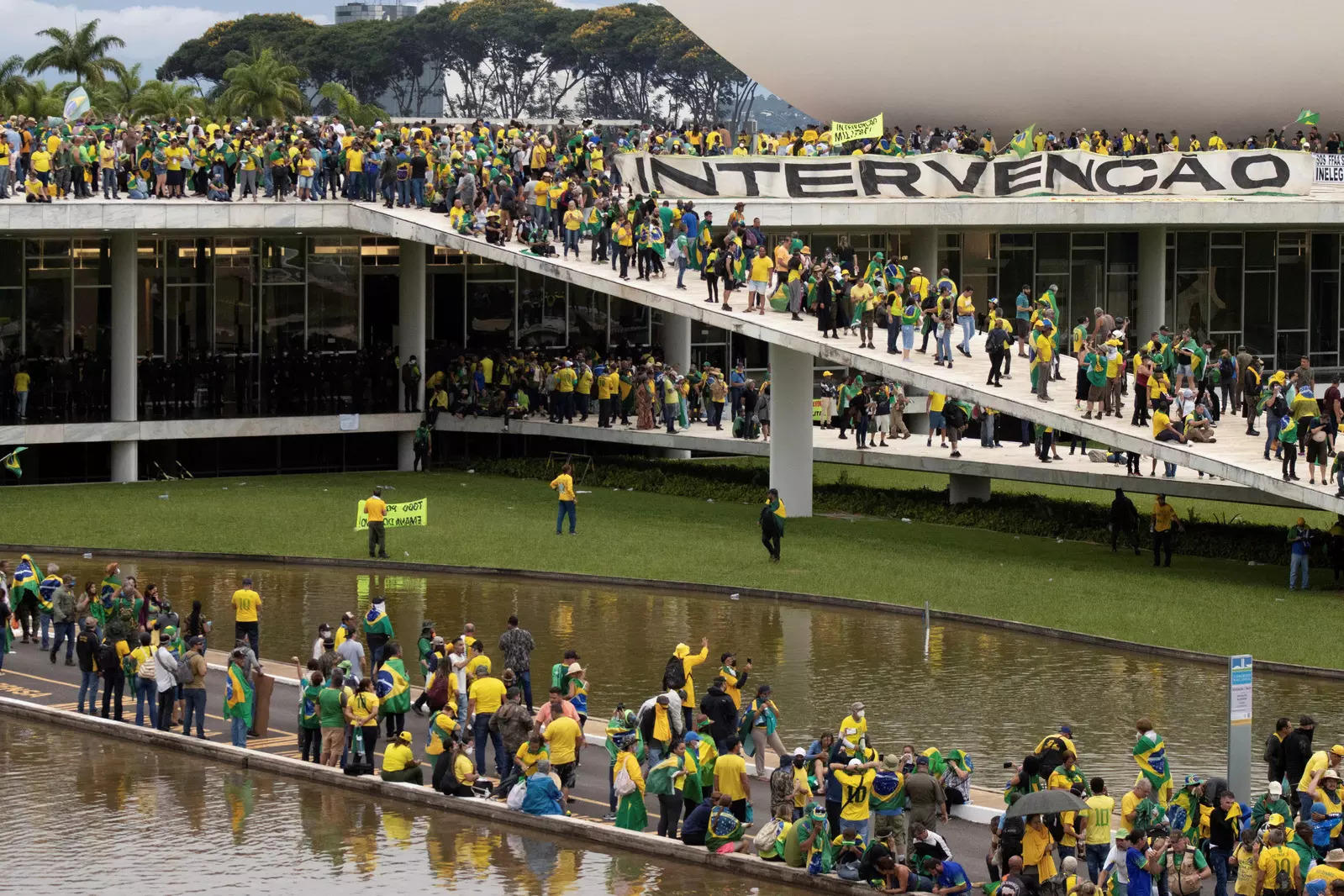What drove a mass attack on Brazil’s capital? Mass delusion. – Times of India
BRASÍLIA: For the past 10 weeks, supporters of ousted far-right President Jair Bolsonaro had camped outside Brazilian army headquarters, demanding that the military overturn October’s presidential election. And for the past 10 weeks, the protesters faced little resistance from the government.
Then, on Sunday, many of the camp’s inhabitants left their tents in Brasília, the nation’s capital, drove a few miles away and, joining hundreds of other protesters, stormed Congress, the Supreme Court and the presidential offices.
By Monday morning, authorities were sweeping through the encampment. They dismantled tents, tore down banners and detained 1,200 of the protesters, ferrying them away in buses for questioning.
Why an encampment demanding a military coup was allowed to expand for more than 70 days was part of a larger set of questions that officials were grappling with Monday, among them:
Why were protests allowed to get so close to Brazil’s halls of power? And why had security forces been so outnumbered, allowing throngs of protesters to easily surge into official government buildings?
Brazil’s justice minister, Flávio Dino, said various security agencies had met Friday to plan for possible violence in the planned protests on Sunday. But, he said, the security strategy hatched in that meeting, including keeping protesters away from the main government buildings, was at least partly abandoned on Sunday and there were far fewer law enforcement officers than had been anticipated.
“The police contingent was not what had been agreed upon,” he said, adding that it was unclear why plans had changed.
Some in the federal government blamed the governor of Brasília, Ibaneis Rocha, and his deputies, suggesting that they had been either negligent or complicit in understaffing the security forces around the protests.
Late Sunday, Alexandre de Moraes, a Supreme Court justice, suspended Rocha from his job as governor for at least 90 days.
Whatever security lapses may have occurred, Sunday’s riot laid bare in shocking fashion the central challenge facing Brazil’s democracy. Unlike other attempts to topple governments across Latin America’s history, the attacks Sunday were not ordered by a single strongman ruler or a military bent on seizing power, but rather were fueled by a more insidious, deeply rooted threat: mass delusion.
Millions of Brazilians appear to be convinced that October’s presidential election was rigged against Bolsonaro, despite audits and analyses by experts finding nothing of the sort.
Then, on Sunday, many of the camp’s inhabitants left their tents in Brasília, the nation’s capital, drove a few miles away and, joining hundreds of other protesters, stormed Congress, the Supreme Court and the presidential offices.
By Monday morning, authorities were sweeping through the encampment. They dismantled tents, tore down banners and detained 1,200 of the protesters, ferrying them away in buses for questioning.
Why an encampment demanding a military coup was allowed to expand for more than 70 days was part of a larger set of questions that officials were grappling with Monday, among them:
Why were protests allowed to get so close to Brazil’s halls of power? And why had security forces been so outnumbered, allowing throngs of protesters to easily surge into official government buildings?
Brazil’s justice minister, Flávio Dino, said various security agencies had met Friday to plan for possible violence in the planned protests on Sunday. But, he said, the security strategy hatched in that meeting, including keeping protesters away from the main government buildings, was at least partly abandoned on Sunday and there were far fewer law enforcement officers than had been anticipated.
“The police contingent was not what had been agreed upon,” he said, adding that it was unclear why plans had changed.
Some in the federal government blamed the governor of Brasília, Ibaneis Rocha, and his deputies, suggesting that they had been either negligent or complicit in understaffing the security forces around the protests.
Late Sunday, Alexandre de Moraes, a Supreme Court justice, suspended Rocha from his job as governor for at least 90 days.
Whatever security lapses may have occurred, Sunday’s riot laid bare in shocking fashion the central challenge facing Brazil’s democracy. Unlike other attempts to topple governments across Latin America’s history, the attacks Sunday were not ordered by a single strongman ruler or a military bent on seizing power, but rather were fueled by a more insidious, deeply rooted threat: mass delusion.
Millions of Brazilians appear to be convinced that October’s presidential election was rigged against Bolsonaro, despite audits and analyses by experts finding nothing of the sort.
For all the latest world News Click Here
Denial of responsibility! TechAI is an automatic aggregator around the global media. All the content are available free on Internet. We have just arranged it in one platform for educational purpose only. In each content, the hyperlink to the primary source is specified. All trademarks belong to their rightful owners, all materials to their authors. If you are the owner of the content and do not want us to publish your materials on our website, please contact us by email – [email protected]. The content will be deleted within 24 hours.


